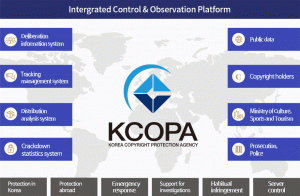The Korea Copyright Protection Agency (KCOPA) has established a foreign language infringement information collection system that can detect and automatically monitor copyrighted works illegally distributed overseas in languages that include English and Chinese. KCOPA has implemented an Integrated Control & Observation Platform (ICOP) to detect and respond to copyright infringement.
By way of background, creative content developed in Korea has become a cultural phenomenon around the world. In response, the Korean President issued a directive to develop a comprehensive strategy to stop illegal distribution of copyrighted content originating in Korea.
A collaborative initiative was announced last July by the Republic of Korea’s Ministry of Culture, Sports and Tourism involving multiple government agencies, to fulfill that directive.

International initiative
In November, the Ministry of Culture Sports and Tourism announced a strategy during 2023 to build a $30 billion content industry, which includes doubling the amount of content exports, from about $920 million in 2023 to $1.8 billion by 2027. To help meet these goals, a K-Contrent Strategy Fund will raise contributions from government, industry and private investment sources; to total more than $750 million in funding.
One way to drive growth is to promote Korean content worldwide. For example, at the 2024 CES conference, the Korea Creative Content Agency (KOCCA), together with the Ministry of Culture, Sports and Tourism, had a dedicated presence; to support the promotion of Korean content into the US and worldwide. They held two conference sessions to communicate Korean technology, copyright and business priorities among content companies, investors and experts. 19 Korean companies were highlighted.
Piracy increasing
In addition to creating growth by building avenues to engagage with Korean stakeholders, illegal use must be minimized. The Korean Ministry of Culture has estimated that illegal streaming sites cost the media industry nearly $4 billion (~5 trillion won), out of a total of more than $12.45 billion in overall content exports. According to a January 2024 report by KOCCA, the media sector was estimated to employ about 617,000 industry professionals.
Noonoo TV is just one notorious pirate that provides illegal streaming services that carry unlicensed Korean- (and internationally-) sourced programming. Serving an estimated 10 million end users and causing losses estimated at about $4 billion, it had been shut down in early 2023 but re-appeared under a different name later in the year. Its servers are said to be in Paraguay, the Dominican Republic and in other countries.
Further reading
What are the global content trends that will prevail in 2024? Conjinwon holds CES 2024 Business Review and Insight. January 19, 2024. Korea Creative Content Agency.
We also detect infringement of K-content into foreign languages. Press release. December 27, 2023. Korea Copyright Protection Agency.
Seoul to crack down on illegal distribution of K-content. Article. July 31, 2023. by Lee Min-young. The Korea Times
Gov’t expands moves to block resurfacing illegal streaming site. Article. June 18, 2023. by Baek Byung-yeul. The Korea Times
Korean Ministry unveils $766.5 million plan to supercharge K-content industry. Article. November 16, 2023. KoreaTechDesk
Content industry sales and exports continue to increase. Conjinwon publishes content industry trend analysis report for first half of 2023. Press release. January 3, 2024. Korea Creative Content Agency
Why it matters
“In Korea, we have established a comprehensive response system and unified the infringement response process such as deliberation, correction recommendation, and access blocking into one system through real-time monitoring,” said KCOPA Director Park Jeong-ryeol.
“We will also focus on responding to K-content infringements occurring overseas and strive to create a healthy distribution environment where our content can receive its fair price,” he said.












